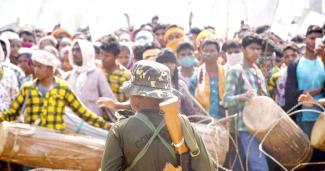Since 2019, 250 security camps have been established in the Bastar region turning the area into a vast cantonment. Since December 2016, 2479 kms of road construction has been sanctioned in the eight districts of Bastar. Roads are being constructed to ‘counter Maoist menace’ and camps are being set up to provide security for construction of roads. And road and rail connectivity is essential for mining in the area. All these together will ensure Vishwas, Vikas, Suraksha, Nyay and Sewa to the people. This in brief is the ‘Development’ story in Bastar. To add to these between 1stJanuary, 2024 to 15thJuly there have been 141 extrajudicial killings in the area, many of whom are alleged to be ordinary civilians. Against this background the ‘Citizens Report on Security and Insecurity: Bastar Division, Chattisgarh’, compiled by a Fact Finding team of eminent civil libertarians and social workers like Bela Bhatia, Krishna VS, Nandini Sundar and others acquire immense significance. Let us dwell on some of the main points of this report.
Mining/roads/camps
In November, 2022 Chattisgarh accounted for 14.8% of the mineral production in India. Two months earlier the then Congress government had shared information on 108 potential mining blocks in the state of which 39 were in Bastar. Of these four were auctioned in 2023. Also amendments were made to the ‘Mines and Minerals (Development and Regulation) Act’ following which private sector was allowed to invest in the exploration of critical and deep-seated minerals which was previously the remit of the public sector. Road and Rail networks were accordingly extended. These projects have come up by acquiring huge areas of forest land made possible by the amendment of Forest Conservation Act in 2022 according to which there is no longer any mandatory consent required of Gram Sabha or local communities for forest land acquisition. Besides regulations mandated by PESA, 1996 (Panchayat Extension to Scheduled Areas) are repeatedly and blatantly flouted.
Have the People Benefitted?
The arrival of mining and transport projects have poisoned rivers, destroyed water sources, led to waste prime agricultural land and uprooted traditional villages. There has been massive deforestation and loss and vandalisation of sacred sites which the adivasis have worshipped through generations. After the mining companies came, livelihood options of local people have shrunk. They were promised employment, but all they got was poorly paid daily-wage work. Most importantly women, who have suffered most because of the acquisition of community lands, have been deprived of employment. Numerous roads have been built, widened but bus services are non-existent. In fact ever since Salwa Judum spread terror in the countryside, bus services have almost stopped. Due to the same reason 123 schools closed down in Sukma district alone. While welfare projects have virtually stopped, the state has invaded into the lives of the people. Even the Haats, the village markets are not spared, their timings are controlled by the omnipresent security camps. People are not allowed to buy groceries in bulk on the assumption that these may be supplied to the Maoists.
Protests and Repression
Since 2019 people have been protesting against the camps. They have consistently launched dharnas, demonstrations and gheraos. In south Bastar people have formed an umbrella organization called ‘Moolvasi Bachao Manch’. In north Bastar protests are mainly organized by ‘Adivasi Adhikar Bachao Manch’ or ‘Sarva Adivasi Samaj’. Though all protests are peaceful, administration term them as Maoist-instigated and all open organizations are castigated as Maoist fronts.
Hence they are suppressed, often brutally. For this various kinds of security forces have been amassed in the camps. Though the Salwa Judum was banned, a force consisting of surrendered Maoists DRG (District Reserve Guard) was formed. This force continues to terrorise the people. From 2011 to 2022, 6804 people have been arrested in the region. The report reveals that large number of people have been arrested for false charges of being Maoists and kept behind bars for years altogether. Inquiry committees have revealed that at places like Sarkeguda ordinary people have been killed by firing. Recently there have been worrying reports of increased use of drones for surveillance and even for dropping explosives. About twenty villages are said to have been targeted with these strikes. However state police and CRPF have denied any drone attacks.
Conclusions
The report concludes that camps are set up to safeguard corporate interests and help the state make deeper inroads into Bastar. Mining companies are operating by violating laws, mainly PESA, forest and environmental laws. This has caused severe environmental destruction resulting in massive livelihood problems. Peaceful protests by villagers have been suppressed by force and there are rampant human rights violations in the area causing arrests, deaths and destruction of villages. The report confirms that militarization of Bastar will achieve nothing except to open up the area for corporate plunder of minerals and other resources.











